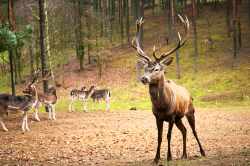European infrastructure for ecosystems research
Europe's natural and cultivated land is under pressure from land-use change, population growth and climate change. To maintain the services it provides, land managers and scientists require better forecasting tools. This need is being addressed by the ANAEE (Infrastructure for analysis and experimentation on ecosystems) project. Its aim is to support scientists in their analysis, assessment and forecasting of the impact of climate and other global changes in the services that ecosystems provide to society. According to project coordinator Dr Abad Chabbi: ′ANAEE aims to transcend traditional barriers by working together to realise a broader vision of international collaboration, thereby enabling ANAEE to resonate both in Europe and globally′. The initiative provides researchers with the necessary research infrastructure (RI) needed to understand and model the functioning of managed and wild ecosystems and to better develop the bioeconomy. ′ANAEE will advance our ecological knowledge as well as our analytical and decision-making tools for a combined societal benefit′, says Dr Chabbi. A vision document has identified the services this RI will provide, especially through a Central Hub headed by a Director-General plus three supranational Service Centres (experimental, analytical and modelling). ′The coordination and integration of national platforms through the latter will ensure international access, improved measurements and data harmonisation, technology development, links between data and models, and open access to data′, Dr Chabbi explains. The technical criteria that the distributed national platforms should meet in order to belong to ANAEE have also been developed. Among the national platforms having expressed their interest in ANAEE, over 100 were short-listed, based on criteria of excellence. Because each has its own protocols and instrumentation, they will receive any necessary upgrades prior to joining the ANAEE RI. Dr Chabbi states: ′This will both optimise the cross-use of platforms in pan-European experiments and ultimately engage individual platforms to take an active role in meeting ANAEE's key challenges.′ Thus, the uniqueness of ANAEE's approach to ecosystem science stems from its capacity to engage with a range of National Platforms. They include natural, open air platforms, hosting in situ experiments, and represent a large range of managed and natural ecosystems that reflect the continent's different climatic and land-use conditions. Enclosed platforms featuring highly controlled environments experimentally test the response of ecosystems to extreme events, natural hazards and climate change. In addition, analytical platforms employ novel techniques and state-of-the-art equipment to better characterise the state of ecosystems and explore unknown processes, while model platforms specialise in model building and simulations. The conditions for future access to these platforms and the data that they collect have been established, as has the involvement of industry. The legal and governance aspects have been agreed upon with the view to creating a European Research Infrastructure Consortium (ERIC). Furthermore, the financial and human resources required to run the ANAEE RI have been evaluated and a business model developed. ANAEE will allow both scientists and society as a whole to increase their understanding of ecosystem processes and the corresponding drivers of change. It will also allow the research community and decision-makers to respond to the growing threats generated by climate change and support the European Research Area (ERA) by understanding and detecting feedback mechanisms and providing high-quality data. According to Dr Chabbi, ANAEE will ′impact on Europe's bioeconomy by championing innovation, generating new market opportunities and strengthening competitiveness.′ The project will support industries as innovation developers or as customers, thereby increasing the technological and organisational readiness to develop new ecosystem experiments. ANAEE will also train the next generation of scientists and decision-makers to maximise the potential of the collected data.
Keywords
Ecosystem science, ANAEE, experimentation, climate change, land use changes, bioeconomy, European Research Infrastructure Consortium, European Research Area







